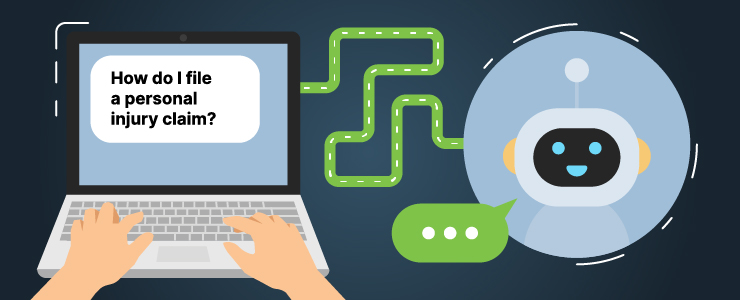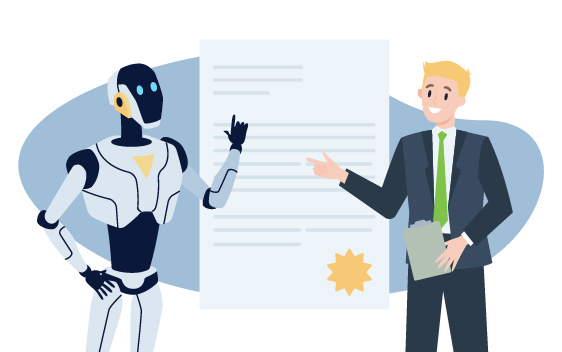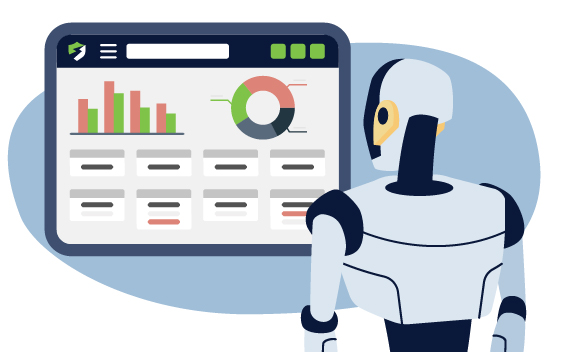How Can ChatGPT Assist Lawyers, Law Firms, and Legal Services Providers?
Do robot lawyers driven by artificial intelligence (AI) await us in the future, or are they already here? If so, what are the ethical implications of using AI in the legal industry?
These questions may sound like they’re from a science fiction novel. Perhaps they conjure visions in your mind of a dystopian future in which society is ruled by robots. But the reality is that these important issues arise from the recent development of AI-powered technology with capabilities that include generating humanlike responses to simple legal questions. In this article, we’ll cover one such tool called ChatGPT as well as the benefits and challenges it poses for lawyers, law firms, and legal professionals.
What is ChatGPT and How Is It Relevant to Lawyers?
ChatGPT first came out in November 2022. Since its release, it has co-authored a scholarly article with a law school dean, passed a law school exam, and had an uncannily human conversation with a journalist. Legal professionals are now experimenting with how it might be used to help lawyers and law firms serve clients.

A couple of the main benefits they’ve found that it can provide are saving time and reducing stress. It does this by completing mundane, tedious, and time-consuming tasks that require little oversight, while also assisting with more complex efforts.
What Are Some Tasks that a Lawyer Can Use Artificial Intelligence to Assist With?
Some of the specific tasks that lawyers and law firms can use AI to assist them with serving clients include:
- Drafting legal documents such as:
- contracts
- correspondence
- discovery demands
- non-disclosure agreements (NDAs)
- employment agreements
- Legal document retrieval and review
- Legal research to find summaries of cases, laws, and pleadings filed in court

Besides providing client services directly, companies in the legal industry are also using ChatGPT-powered artificial intelligence to provide services to legal professionals including:
- Legal marketing content generation such as:
- Topic research
- Creating content outlines to be edited by human lawyers
- Drafting client follow-up materials
- Suggesting Google review responses
- Researching Search Engine Optimization (SEO) keywords
- Generating redlined versions of contracts using language from preapproved clauses
- Providing instant summaries of docket sheet content with tooltips
- Negotiating and summarizing contract terms
What Are Some Limitations of AI for Legal Services?
Before you sign your law firm up for ChatGPT’s premium service, there are a few things to keep in mind:
- The technology is in its infancy – There is still much we don’t know about how it applies to the law and the legal profession.
- Sometimes it lacks accuracy – ChatGPT has been known to falsify information, either by providing answers that are flat-out wrong, or even making things up, such as referencing a California law that doesn’t exist.
- It’s not a human – The law was created by humans for humans. No artificial intelligence can understand the human experience or have human insights which are crucial to consistently achieving successful outcomes for clients.
- Data privacy and security – Besides ethical concerns, lawyers must also be concerned about protecting client data they collect or use with ChatGPT. A data breach could have ethical and financial consequences for a lawyer or law firm responsible for losing sensitive client data.
In addition to the above, lawyers must follow ethical and professional guidelines which may preclude using AI to serve their clients. Due to the recent development of AI tools for the legal profession, it is hard to know exactly how the rules apply to artificial intelligence.
Will AI Replace Lawyers?
No one can predict the future, but there’s far more to generating positive results for clients than acting robotically. It’s safe to assume that human insight and experience will always be a necessary part of the legal profession.
And the pushback against AI lawyering has already begun. For example, a law firm recently sued the AI-driven “robot lawyer” company DoNotPay for offering legal advice and practicing law without a degree. DoNotPay claims that it can help clients “sue anyone” and use the law to “fight corporations, beat bureaucracy, (and) find hidden money” without the need to hire a lawyer. The outcome of that suit is pending, but the non-lawyer CEO was also threatened by State Bar prosecutors with jail time for using a chatbot to advise a defendant in a traffic court case.
How Can ChatGPT Integrate with GrowPath?

One of the coolest things about ChatGPT and other artificial intelligence tools is that you can use them with GrowPath legal case management software because GrowPath leverages AI to help your firm automate processes and increase revenue. For example, GrowPath uses AI to power Patented Algorithms that helps your firm scale and win more cases without hiring more support staff. One way it does this is with Dynamic Real-Time Lead Scoring which automatically weighs the facts of potential cases to estimate their value. It then scores them according to your criteria and alerts you when a case reaches a high enough score for you to follow up on. This results is enhanced efficiencies that drive increased revenues throughout your entire firm.
Reach out now to schedule a free demo and see how GrowPath can help you save time and reduce stress so you can grow and develop your practice with AI.
Bonus: ChatGPT on ChatGPT
We asked ChatGPT how it can be useful to lawyers, and here’s the response it gave:
ChatGPT can be useful for lawyers in several ways:
- Legal Research: ChatGPT can assist lawyers in conducting legal research by providing them with relevant case law, statutes, and regulations. Lawyers can ask ChatGPT legal questions and receive prompt and accurate answers, saving them time and effort.
- Document Review: ChatGPT can help lawyers review documents quickly and efficiently. Lawyers can provide ChatGPT with a set of criteria to identify and extract specific information and documents.
- Legal Writing: ChatGPT can assist lawyers in drafting legal documents such as contracts, agreements, and briefs. Lawyers can provide ChatGPT with specific requirements, and ChatGPT can generate a draft document that the lawyer can then edit and revise as needed.
- Client Interaction: ChatGPT can help lawyers communicate with clients by answering their questions and providing information about legal procedures, timelines, and requirements.
- Training and Education: ChatGPT can be used as a training tool for law students and new lawyers. They can ask ChatGPT legal questions and receive immediate feedback, helping them to develop their legal research and writing skills.
Overall, ChatGPT can be a valuable tool for lawyers, helping them save time and effort, improve their research and writing, and improve communication with clients.